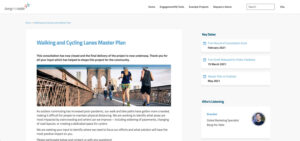Best Practice for Archiving Completed Projects
Ever wondered what to do when you community engagement consultation is over? Well you’re not on your own. One of the most common questions we get asked about online engagement is what to do with consultations once they have concluded.
Because this is such an important question to answer for good community engagement practice, we thought we’d chime-in with some best practice tips for archiving projects in EngagementHQ.
Why is archiving projects so important?
Before we take a look at some of the more practical aspects of archiving projects in EngagementHQ, it’s best to quickly go over the reasons why this practice is so important.
Without overstating the obvious, archiving projects and making them available to your community as a record of consultation activities is important these main reasons.
- Transparency – Archiving projects is an essential mechanism of transparency, record keeping and evidence of consultation activities. In order to ensure that your organisation is accountable for any decisions made with community input, providing access to completed consultations and their outcomes will be critical.
- Build Trust – By making your past activities available for people to check back on, you help to build trust between the community and your engagement activities. From past experience we know that community participants like to peruse consultation portals before making a judgement about whether they will get involved. If they can see outcomes of past consultations, they are more likely to build a sense of trust in your commitment to hearing their views and this could help them make their decision to get involved. Moreover, for those that have already been involved in a consultation, making the outcomes available for them to see and review helps with the process of closing-the-loop and makes your participants feel like their time was worthwhile spent.
- Reference – Archiving projects allows you to reference old projects in the construction of new consultations. By having a living record of your communities views on a range of different matters, it becomes really easy to point people to past consultations when setting up new engagement projects as critical reference points.
- Freedom of Information – In many parts of the world Freedom of Information legislation allows for public records to be provided on request. Having an organised archive of consultation outcomes and projects can make filling any requests like this much easier.
- Managing your Projects List – Ensuring you have archived your old projects will help to clean up your projects lists and help you with better management of your current published projects.
- Tells a story – Providing easy access also helps to build a narrative of engagement which can be drawn on for public relations and marketing benefits.
- Every project has a beginning, middle and end – If you’re not closing the loop on your engagements and archiving your project with published outcomes then you are forgetting the basic formula for every consultation.
How do you archive projects in EngagementHQ?
With every project page in EngagementHQ there are three publishing states, including archive, draft and published.
In order for you to properly manage your project list (see image below) we recommend always archiving your projects once they are complete.
Sometimes we see completed projects remain published for years after their completion date, which can make your project list unwieldy and we even see old projects unpublished back into draft mode, which make them no longer available for community members to refer to.

Properly archiving your projects when they are finished will ensure that you’ve closed off all of the tool activities from receiving further contributions and also help you to manage your projects.
To archive projects you will need to prepare the following;
- Text explaining the outcomes of the project
- Supporting documents, reports etc.
Once you have the above materials ready you can then archive your individual projects.
To do this, you will need to navigate to your project and click on published and select archive from the drop down.

When you archive a project you will be asked to either archive your project immediately or to schedule it for a later date.
You will also be prompted to provide an archival message. Use this message to enter in the text explaining the outcomes of your project and link directly to any documents which can support the completion of the project (see below).

Finally, you will need to decided if you want to keep the project visible for your community to view later.
Although this is optional, we strongly recommend you leave this box ticked so your community can view the outcome of the project.
You should also ensure that you have updated your lifecycle widget to reflect the final or end-stage of your consultation and also add your project outcomes to the document library of your newly archived project page.
If you have done this correctly, your archived project page should look like the below example project.

In order to make your archived projects available, we recommend using the All Projects page, which can be accessed by adding /projects to the end of your site URL.
You can use this link to create a navigation item called All Projects and link directly to this from your navigation menu.
To learn more about how to archive projects in EngagementHQ, check out our help resource.
